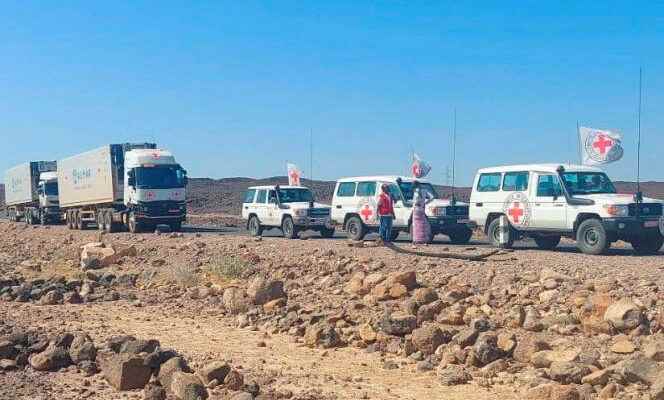A World Food Program (WFP) convoy entered the Ethiopian region of Tigray on Wednesday (November 16th), the first since the signing in early November of an agreement intended to end two years of conflict in northern Ethiopia. It is also the first WFP convoy to enter Tigray since the interruption at the end of August of the delivery of humanitarian aid due to the resumption of fighting after a five-month truce.
In mid-October, the WFP estimated that 5.4 million people needed food aid in Tigray, some 90% of its approximately six million inhabitants. According to the UN agency, Wednesday’s convoy passed through the neighboring region of Amhara. This route had not been used since a rebel offensive outside Tigray in June 2021. The Amhara forces and militias, which supported the Ethiopian federal army against the Tigrayan rebels, had until then refused passage through their region of aid to Tigray, according to humanitarian sources.
“A WFP convoy has just entered (…) in Tigray via the Gondar corridor [ville amhara située à 180 km du Tigré]for the first time since June 2021”, welcomes the UN organization. World Food Program trucks “are now arriving in Tigray with essential food aid. This is the first movement since the signing of the peace agreement.wrote in a tweet David Beasley, head of the WFP.
This convoy is made up of fifteen trucks, Claire Nevill, a spokeswoman for the WFP, told AFP. “Vital food aid will now be distributed in the coming days to the population of the locality of Mai Tsebri”located about thirty kilometers inside Tigray, continues the WFP, and “additional food and medical cargo will follow imminently, via all possible routes”.
The military leaders of the two camps initialed on Saturday a document implementing this agreement, in particular concerning the disarmament of the rebels, the restoration of services and the delivery “without hindrance” humanitarian aid to Tigray.
Not enough aid
A senior US State Department official told reporters on Tuesday that the United States would not hesitate to use sanctions “if necessary to hold accountable those responsible for human rights violations or to attempt to enforce this agreement”.
On the same day, the International Committee of the Red Cross (ICRC) sent to Makalé, the capital of Tigray, its first convoy, loaded with medical aid, since the end of August. “The ICRC hopes to continue these deliveries on a regular basis and significantly increase the humanitarian response in Tigray”, had indicated the organization. Before the delivery of aid – already largely insufficient – was interrupted by the resumption of fighting, only one route, passing through the Afar region, bordering eastern Tigray, was open to humanitarian convoys.
The conflict in Tigray began in November 2020 when Ethiopian Prime Minister Abyi Ahmed sent the federal army there to arrest leaders in the region, who had challenged his authority for months and whom he accused of attacking federal military bases. on the spot.
The toll of two years of war in northern Ethiopia is unknown. But this caused a humanitarian disaster, displacing more than two million people and plunging several hundred thousand Ethiopians into conditions close to famine, according to the UN. In October, the head of the United States Agency for Humanitarian Aid (USAID), Samantha Power, spoke of a balance sheet “staggering” and the International Crisis Group (ICG) and Amnesty International consider this to be one of the conflicts “world’s deadliest”.
Tigray has been virtually cut off from the world for more than a year and is sorely lacking in food and medicine. The region is also deprived of electricity, telecommunications, banking services and fuel. The Ethiopian government has been repeatedly accused of besieging and starving the region, which it has always strongly denied.
To not miss any African news, subscribe to the newsletter of the “World Africa” from this link. Every Saturday at 6 a.m., find a week of news and debates covered by the editorial staff of the “World Africa”.
